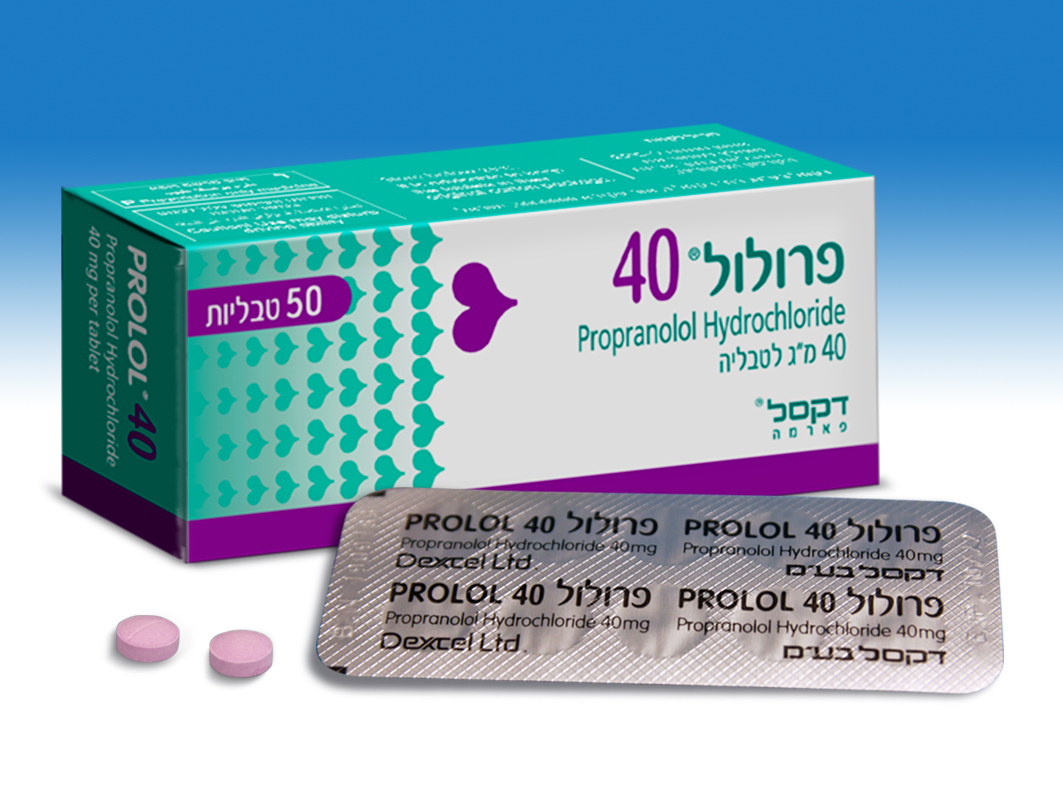Quest for the right Drug

פרולול 40 PROLOL 40 (PROPRANOLOL HYDROCHLORIDE)
תרופה במרשם
תרופה בסל
נרקוטיקה
ציטוטוקסיקה
צורת מתן:
פומי : PER OS
צורת מינון:
טבליה : TABLETS
עלון לרופא
מינוניםPosology התוויות
Indications תופעות לוואי
Adverse reactions התוויות נגד
Contraindications אינטראקציות
Interactions מינון יתר
Overdose הריון/הנקה
Pregnancy & Lactation אוכלוסיות מיוחדות
Special populations תכונות פרמקולוגיות
Pharmacological properties מידע רוקחי
Pharmaceutical particulars אזהרת שימוש
Special Warning עלון לרופא
Physicians Leaflet
Pharmacological properties : תכונות פרמקולוגיות
Pharmacodynamic Properties
5.1 Pharmacodynamic properties Pharmacotherapeutic group: Beta blocking agents, non-selective, ATC code: C07AA05 Propranolol is a competitive antagonist at both the beta1- and beta2- adrenoceptors. It has no agonist activity at the beta-adrenoceptor, but has membrane stabilising activity at concentrations exceeding 1-3 mg/litre, though such concentrations are rarely achieved during oral therapy. Competitive beta-blockade has been demonstrated in man by a parallel shift to the right in the dose-heart rate response curve to beta-agonists such as isoprenaline. Propranolol as with other beta-blockers, has negative inotropic effects, and is therefore contraindicated in uncontrolled heart failure. Propranolol is a racemic mixture and the active form is the S (-) isomer of propranolol. With the exception of inhibition of the conversion of thyroxine to triiodothyronine, it is unlikely that any additional ancillary properties possessed by R (+) propranolol, in comparison with the racemic mixture, will give rise to different therapeutic effects. Propranolol is effective and well tolerated in most ethnic populations, although the response may be less in black patients.
Pharmacokinetic Properties
5.2 Pharmacokinetic properties Following intravenous administration, the plasma half-life of propranolol is about 2 hours and the ratio of metabolites to parent drug in the blood is lower than after oral administration. In particular 4-hydroxypropranolol is not present after intravenous administration. Propranolol is completely absorbed after oral administration and peak plasma concentrations occur 1 to 2 hours after dosing in fasting patients. The liver removes up to 90% of an oral dose with an elimination half-life of 3 to 6 hours. Propranolol is widely and rapidly distributed throughout the body with highest levels occurring in the lungs, liver, kidney, brain and heart. Propranolol is highly protein bound (80 to 95%).

פרטי מסגרת הכללה בסל
התרופה תינתן לטיפול במקרים האלה:א. יתר לחץ דםב. תעוקת חזה (angina pectoris)ג. טכיקרדיה סופרא ונטריקולרית (supraventricular tachycardia)ד. פרפור פרוזדורים (Atrial fibrillation)ה. רפרוף פרוזדורים (Atrial flutter)ו. הפרעת קצב על רקע שימוש בדיגיטאליס (digitalis induced arrhythmia)ז. קרדיומיופתיה היפרטרופית חסימתית (hypertrophic obstructive cardiomyopathy)ח. לאחר אוטם שריר הלב (post myocardial infarction)ט. היפרתירואידיזםי. רעד ראשוני (essential tremor)יא. מיגרנהיב. פיאוכרומוציטומהיג. מניעת אירועים היפוקסיים (hypoxic spells) בילדים הלוקים ב-Tetralogy of Fallot
שימוש לפי פנקס קופ''ח כללית 1994
Hypertension, angina pectoris, supraventricular tachycardia, atrial fibrillation and flutter, digitalis induced arrhythmia, hypertrophic obstructive cardiomyopathy, post myocardial infarction, hyperthyroidism, essential tremor, migraine, pheochromocytoma. Children: prevention of hypoxic spells in Tetralogy of Fallot
תאריך הכללה מקורי בסל
01/01/1995
הגבלות
תרופה שאושרה לשימוש כללי בקופ'ח
מידע נוסף
